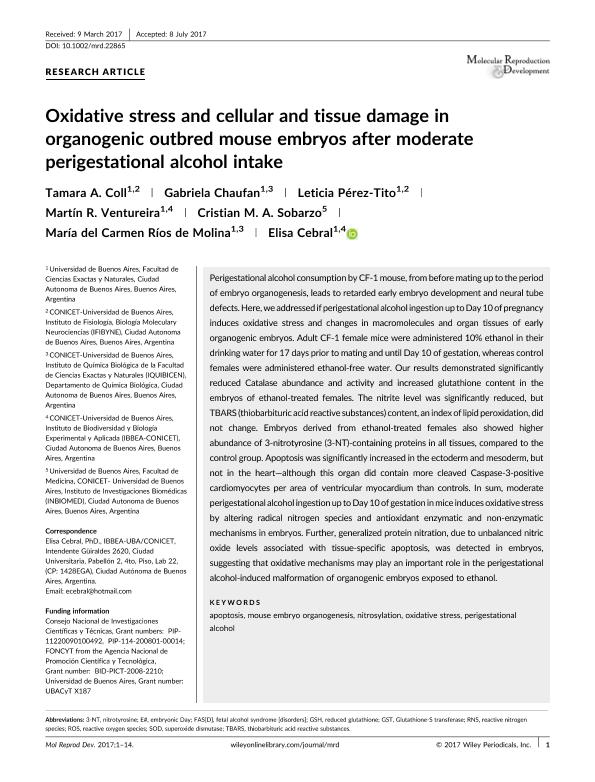Artículo
Oxidative stress and cellular and tissue damage in organogenic outbred mouse embryos after moderate perigestational alcohol intake
Coll, Tamara Anahí ; Chaufan, Gabriela
; Chaufan, Gabriela ; Pérez Tito, Leticia Gabriela
; Pérez Tito, Leticia Gabriela ; Ventureira, Martín Ricardo
; Ventureira, Martín Ricardo ; Sobarzo, Cristian Marcelo; Rios, Maria del Carmen
; Sobarzo, Cristian Marcelo; Rios, Maria del Carmen ; Cebral, Elisa
; Cebral, Elisa
 ; Chaufan, Gabriela
; Chaufan, Gabriela ; Pérez Tito, Leticia Gabriela
; Pérez Tito, Leticia Gabriela ; Ventureira, Martín Ricardo
; Ventureira, Martín Ricardo ; Sobarzo, Cristian Marcelo; Rios, Maria del Carmen
; Sobarzo, Cristian Marcelo; Rios, Maria del Carmen ; Cebral, Elisa
; Cebral, Elisa
Fecha de publicación:
10/2017
Editorial:
Wiley-liss, Div John Wiley & Sons Inc
Revista:
Molecular Reproduction and Development
ISSN:
1040-452X
Idioma:
Inglés
Tipo de recurso:
Artículo publicado
Clasificación temática:
Resumen
Perigestational alcohol consumption by CF-1 mouse, from before mating up to the period of embryo organogenesis, leads to retarded early embryo development and neural tube defects. Here, we addressed if perigestational alcohol ingestion up to Day 10 of pregnancy induces oxidative stress and changes in macromolecules and organ tissues of early organogenic embryos. Adult CF-1 female mice were administered 10% ethanol in their drinking water for 17 days prior to mating and until Day 10 of gestation, whereas control females were administered ethanol-free water. Our results demonstrated significantly reduced Catalase abundance and activity and increased glutathione content in the embryos of ethanol-treated females. The nitrite level was significantly reduced, but TBARS (thiobarbituric acid reactive substances) content, an index of lipid peroxidation, did not change. Embryos derived from ethanol-treated females also showed higher abundance of 3-nitrotyrosine (3-NT)-containing proteins in all tissues, compared to the control group. Apoptosis was significantly increased in the ectoderm and mesoderm, but not in the heart—although this organ did contain more cleaved Caspase-3-positive cardiomyocytes per area of ventricular myocardium than controls. In sum, moderate perigestational alcohol ingestion up to Day 10 of gestation in mice induces oxidative stress by altering radical nitrogen species and antioxidant enzymatic and non-enzymatic mechanisms in embryos. Further, generalized protein nitration, due to unbalanced nitric oxide levels associated with tissue-specific apoptosis, was detected in embryos, suggesting that oxidative mechanisms may play an important role in the perigestational alcohol-induced malformation of organogenic embryos exposed to ethanol.
Archivos asociados
Licencia
Identificadores
Colecciones
Articulos(IQUIBICEN)
Articulos de INSTITUTO DE QUIMICA BIOLOGICA DE LA FACULTAD DE CS. EXACTAS Y NATURALES
Articulos de INSTITUTO DE QUIMICA BIOLOGICA DE LA FACULTAD DE CS. EXACTAS Y NATURALES
Citación
Coll, Tamara Anahí; Chaufan, Gabriela; Pérez Tito, Leticia Gabriela; Ventureira, Martín Ricardo; Sobarzo, Cristian Marcelo; et al.; Oxidative stress and cellular and tissue damage in organogenic outbred mouse embryos after moderate perigestational alcohol intake; Wiley-liss, Div John Wiley & Sons Inc; Molecular Reproduction and Development; 84; 10; 10-2017; 1086-1099
Compartir
Altmétricas



